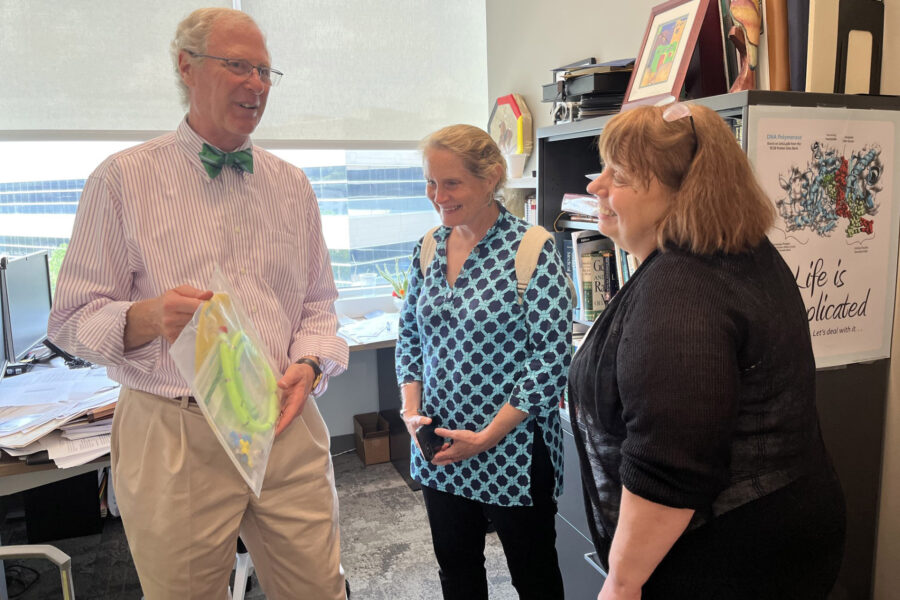It’s a childhood memory Trevor Champagne, MD, an enrolled member of the Red Lake Band of Ojibwe, won’t soon forget.
He was standing in the living room of his grandparents’ home after accompanying his grandfather to the local Indian Health Service clinic when his grandfather asked the then 9-year-old an unexpected question.
“He asked me if I would give him his insulin injection,” Dr. Champagne said.
Nervous but obedient, Dr. Champagne did as he was told.
It was at that moment that his grandmother told him, “Trevor, we need more Native doctors.”
Now a first-year resident in the UNMC Department of Physical Medicine and Rehabilitation, Dr. Champagne is fulfilling his grandparents’ and tribe’s hopes by pursuing a career in medicine.
Dr. Champagne recounted his journey into the medical field with a group of Native American high school students during a Native American talking circle as part of the Summer Health Professions Education Program Weeklong Institute for Students in High School (SHPEP-WISH).
Sitting in the back of the room were two visitors from the National Institute of Health Division of Neurological Disorders and Strokes, who were in Omaha in mid-July to observe and learn more about the Native-focused enrichment programs offered at UNMC.
“These programs have great faculty and staff. They are dedicated to providing exceptional learning experiences and giving each student individualized attention,” said Nancy Bowen, DrPH, with the office of the scientific director for the National Institute of Neurological Disorders and Stroke at the National Institutes of Health. “The depth and breadth of their knowledge, area of expertise, skills and network of connections complement one another.”
Rita Devine, PhD, assistant director for science administration in the division of intramural research at the NIH, and Dr. Bowen said they were impressed with the commitment of the Youth Enjoy Science (YES) SHPEP-WISH program, which is led by YES MPIs Maurice Godfrey, PhD, Regina Idoate, PhD, Joyce Solheim, PhD, and Aislinn Rookwood, the YES-WISH program manager, and the Indigenous-Summer Program for Advancing Research Knowledge (ISPARK), which is led by Liliana Bronner.
“It is a pleasure and honor to know folks who are so well respected by the communities they serve,” Dr. Devine said.
“We hope that the students who have gone through these programs will look to further their interests in science and come to the National Institutes of Health for the Summer Internship Program once they are 18,” she said.
“We have been fortunate to have had several NIH directors visit our programs over the years,” Dr. Godfrey said. “Their firsthand exposure is invaluable to appreciate the impact on the communities we serve. Drs. Devine and Bowen saw UNMC’s dedication to expanding pathways to health and science careers in tangible and engaging ways.”
Said Bronner: “I hope this visit will give federal officials an appreciation of what is done on the ground with the funding they award — personally getting to know the youth that benefit from the outreach provided, the cross collaboration that takes place within and outside our institution, the challenges faced by participants, and the opportunities that have enabled students to continue to explore STEM and health career pathways.”
Since 2017, 63 Native American students representing six tribes from the region have participated in I-SPARK and 59 students have taken part in SHPEP-WISH.
The programs, purposefully planned to include aspects of Indigenous culture, often open with a regional Native American drum group and local elder on hand to pray for and bless the students on their journey.
The talking circle included panelists representing four tribes and one Alaskan native, with each person detailing their own personal journey into their chosen health profession.
“I beat the odds,” Siobhan Wescott, MD, Athabascan, told the students. Dr. Wescott is the Dr. Susan and Suzette La Flesche Professor of American Indian Health at UNMC. “I came from a tiny cabin with a well in the middle of nowhere to attend one of the best medical schools in the country – Harvard. And you can do it too.”
